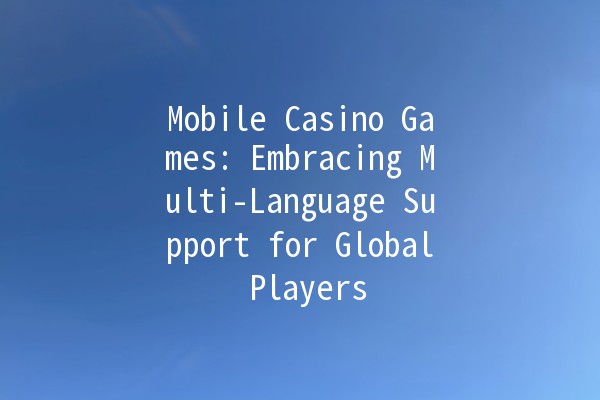The gaming industry has experienced tremendous transformation over the past few years, particularly due to the emergence of mobile casino games. As the market expands, the need for multilanguage support becomes increasingly crucial. The ability to cater to diverse player demographics opens doors to new opportunities and enhances the gaming experience for all players worldwide. In this article, we will explore various aspects of mobile casino games with multilanguage support, providing practical advice and actionable techniques to maximize user engagement and retention.
Understanding the Importance of MultiLanguage Support
Mobile casino games attract players from various cultural backgrounds, with unique language preferences. By offering multilanguage support, game developers can significantly improve user experience and satisfaction. Here are several reasons why multilanguage capabilities are essential for mobile casino games:

Key Techniques for Implementing MultiLanguage Support
Implementing multilanguage support in mobile casino games involves several critical steps. Here are five specific productivityenhancing techniques to achieve this:
Localization is more than just translating text; it encompasses cultural adaptation to ensure the game resonates with local audiences. Professional localization services employ linguists familiar with local customs, language nuances, and gaming regulations for your target markets.
Example: If launching a casino game in Japan, a professional localization team can help adapt promotional materials and game designs to appeal to Japanese players, ensuring that cultural references and humor are contextually appropriate.
The UI should be adaptable to accommodate texts of varying lengths and complexities across languages. A flexible design ensures that all players have a seamless experience, regardless of the language they choose.
Example: When localizing a game's buttons and menus, ensure that they can expand or change size to match different languages, like German or nish, where translations can be longer than their English equivalents.
Allowing users to select their preferred language during registration or in settings can streamline their experience. This feature lets players comfortably navigate the platform from the moment they sign up.
Example: Upon signing up, a player could be prompted to select their preferred language. This setting would adjust the interface and communication preferences for all future sessions, improving user engagement.
Continuous updates are necessary to keep up with changing languages and slang. Regularly updating localized content ensures that it remains relevant and engaging to players.
Example: If a new slang term becomes popular in a specific region, it can be integrated into the game dialogues or promotional content to resonate more with the local player base.
Implement feedback options to gather player insights about their experience with multilanguage support. This information can help identify areas for improvement.
Example: After a game update or release, send out surveys to players asking about their language experience. Feedback about translation clarity, ease of use, and overall satisfaction can guide future localization efforts.
Mobile Casino Games and Global Market Trends
The adaptability in language support also aligns with current global gaming trends. Here are some thriving trends worth noting:
Rise in Mobile Gaming Popularity
Mobile gaming is surging, with an increasing number of players preferring the convenience of gaming on their smartphones. In this context, mobile casino games with multilanguage support can tap into this growing market.
Emphasis on Personalization
Players seek personalized gaming experiences tailored to their preferences. Language support plays a fundamental role in this personalization by ensuring that players feel understood and catered to in their native language.
Integration of Innovative Technologies
With advancements in AI and machine learning, developers can create smarter, more intuitive games. These technologies can optimize language usage and enhance realtime translation functionalities during gameplay.
Common Misconceptions About MultiLanguage Support
Misconception 1: Translations Are Enough
Many believe that simply translating content suffices. However, localization is necessary to adapt content meaningfully for different cultures and regions.
Misconception 2: It’s Only Necessary for Major Languages
While major languages like English, Spanish, and Mandarin are crucial, smaller language groups can also represent sizable markets. Neglecting these languages can result in losing potential players.
Misconception 3: Localization Is a OneTime Process
Localization should be an ongoing effort. Regular updates and monitoring ensure that your content stays relevant and culturally aligned with the target audience.
Frequently Asked Questions
Multilanguage support is crucial as it broadens the user base, enhances user experience, promotes trust, and ensures compliance with local regulations.
Research your target markets, analyze user demographics, and review regional gaming laws to determine which languages will best support your platform.
The localization process generally includes translation of text, adaptation of content to fit cultural contexts, UI adjustments, and quality assurance testing.
Hire professional localization services that specialize in gaming translations. Native speakers can offer insights into regional idioms and cultural nuances that automated systems may miss.
Utilizing AIpowered translation services, localization management platforms, and user management systems can streamline the process of integrating multilanguage support.
Yes, costs can vary based on the complexity of the game and the number of languages supported. Budgeting for professional translators, localization tools, and potential UI adjustments is essential.
al Thoughts
As the landscape of mobile gaming continues to diversify, multilanguage support emerges as a pivotal aspect of enhancing user engagement and expanding market reach. By prioritizing localization, investing in usercentric designs, and leveraging technology, developers can create immersive experiences tailored to a global audience. Embracing these strategies can position mobile casino games for sustained success and higher player satisfaction.
By implementing the above techniques and understanding the role of multilanguage support, developers can thrive in the competitive mobile casino market. The effort invested in catering to diverse language needs will undoubtedly translate into a significant return in user loyalty, engagement, and growth.